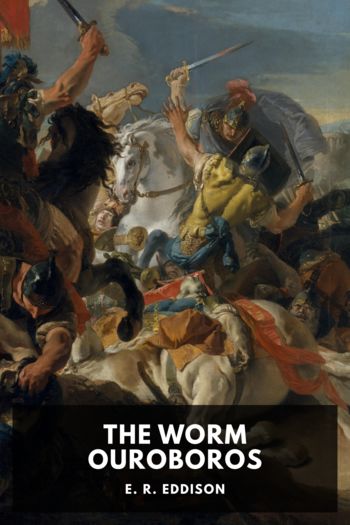The Cream of the Jest by James Branch Cabell (the first e reader TXT) 📕

- Author: James Branch Cabell
Book online «The Cream of the Jest by James Branch Cabell (the first e reader TXT) 📕». Author James Branch Cabell
These three were a few among the prominent worthies of remoter days whom Kennaston was enabled to view as they appeared in the flesh; but, as a rule, chance thrust him into the company of mediocre people living ordinary lives amid surroundings which seemed outlandish to him, but to them a matter of course. And everywhere, in every age, it seemed to him, men stumbled amiable and shatter-pated through a jungle of miracles, blind to its wonderfulness, and intent to gain a little money, food and sleep, a trinket or two, some rare snatched fleeting moments of rantipole laughter, and at the last a decent bed to die in. He, and he only, it seemed to Felix Kennaston, could see the jungle and all its awe-inspiring beauty, wherethrough men scurried like feebleminded ants.
He often wondered whether any other man had been so licensed as himself; and prowling, as he presently did, in odd byways of printed matter—for he found the library of his predecessor at Alcluid a mine rich-veined with strangeness—Kennaston lighted on much that appeared to him significant. Even such apparently unrelated matters as the doctrine of metempsychosis, all the grotesque literature of witches, sorcerers and familiar spirits, and of muses who actually prompted artistic composition with audible voices, were beginning to fall into cloudily-discerned interlocking. Kennaston read much nowadays in his dead uncle’s books; and he often wished that, even at the expense of Felix Kennaston’s being reduced again to poverty, it were possible to revivify the man who had amassed and read these books. Kennaston wanted to talk with him.
Meanwhile, Kennaston read of Endymion and Numa, of Iason and Anchises, of Tannhäuser, and Foulques Plantagenet, and Raymondin de la Forêt, and Olger Danske, and other mortal men to whom old legend-weavers, as if wistfully, accredited the love of immortal mistresses—and of less fortunate nympholepts, frail babbling planet-stricken folk, who had spied by accident upon an inhuman loveliness, and so, must pine away consumed by foiled desire of a beauty which the homes and cities and the tilled places of men did not afford, and life did not bring forth sufficingly. He read Talmudic tales of Sulieman-ben-Daoud—even in name transfigured out of any resemblance to an amasser of reliable axioms—that proud luxurious despot “who went daily to the comeliest of the spirits for wisdom”; and of Arthur and the Lady Nimuë; and of Thomas of Ercildoune, whom the Queen of Faëry drew from the merchants’ marketplace with ambiguous kindnesses; and of John Faustus, who “through fantasies and deep cogitations” was enabled to woo successfully a woman that died long before his birth, and so won to his love, as the book recorded, “this stately pearl of Greece, fair Helena, the wife to King Menelaus.”
And, as has been said, the old idea of muses who actually prompted artistic composition, with audible voices, took on another aspect. He came to suspect that other creative writers had shared such a divided life as his was now, for of this he seemed to find traces here and there. Coleridge offered at once an arresting parallel. Yes, Kennaston reflected; and Coleridge had no doubt spoken out in the first glow of wonder, astounded into a sort of treason, when he revealed how he wrote “Kubla Khan;” so that thus perhaps Coleridge had told far more concerning the origin of this particular poem than he ever did as to his later compositions. Then, also, I have a volume of Herrick from Kennaston’s library with curious comments penciled therein, relative to “Lovers How They Come and Part” and “His Mistress Calling Him to Elysium;” a copy of Marlowe’s Tragical History of Doctor Faustus is similarly annotated; and on a flyleaf in Forster’s Life of Charles Dickens, apropos of passages in the first chapter of the ninth book, Kennaston has inscribed strange speculations very ill suited to general reading. All that Kennaston cared to print, however, concerning the hypothesis he eventually evolved, you will find in The Tinctured Veil, where he has nicely refrained from too-explicit writing, and—of course—does not anywhere point-blank refer to his personal experiences.
Then Kennaston ran afoul of the Rosicrucians, and their quaint dogmas, which appeared so preposterous at first, took on vital meanings presently; and here too he seemed to surprise the cautious whispering of men who neither cared nor dared to speak with candor of all they knew. It seemed to him he understood that whispering which was everywhere apparent in human history; for he too was initiate.
He wondered very often about his uncle. …
XXII Of Truisms: Treated ReasonablyHe seemed, indeed, to find food for wonder everywhere. It was as if he had awakened from a dragging nightmare of life made up of unimportant tasks and tedious useless little habits, to see life as it really was, and to rejoice in its exquisite wonderfulness.
How poignantly strange it was that life could afford him nothing save consciousness of the moment immediately at hand! Memory and anticipation, whatever else they might do—and they had important uses, of course, in rousing emotion—yet did not deal directly with reality. What you regretted, or were proud of, having done yesterday was no more real now than the deeds of Caesar Borgia or St. Paul; and what you looked forward to within the half-hour was as nonexistent as the senility of your unborn great-grandchildren.





Comments (0)